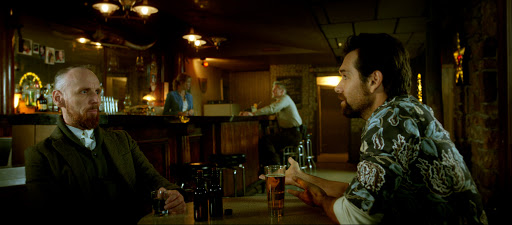What to Watch Verdict
'American Sausage Standoff' holds America accountable as an outsider faces prejudice against artisanal sausages, marrying humor and indictment like grain mustard and smokey brats.
Pros
- +
🌭 Ewen Bremner carries himself as a proud sausage maker.
- +
🌭 Antony Starr plays American so well.
- +
🌭 Flavorful acceptance commentary.
Cons
- -
🌭 Tonally bounce-about.
- -
🌭 More successful at building characters than breaking them down.
- -
🌭 Goes places some might not tolerate.
A crackling sizzle accompanies commentaries in films like American Sausage Standoff—a condemnation of American culture from an international perspective (Danish, to be precise here). Writer and director Ulrich Thomsen encases racism, homophobia, and hatred within intestinal pig wrappings for a distinctly overseas flavor. Culinary specialties become a metaphor as southern-slash-midwest hospitality combats against foreign influencers in a desperate effort to keep our nation “great,” as Bavarian links dare challenge red meat, white bread, and Igloo blue barbecue staples. It sounds silly; a town divided as immigrants share their secret recipes. Still, there’s no better distillation of the ludicrousness of promoting xenophobia because you’re afraid a few weenies might collapse your fragile patriotic complex.
I like what Thomsen cooks up as another tale of Trumpian superiority failing our nation’s melting pot menu—except when the film’s darker twists land better as momentary shocks than developed, devastating blows.
In the rural-as-heck town of Gutterbee, ex-con Mike Dankworth McCoid (Antony Starr) and German orphan Edward Hofler (Ewen Bremner) dream of opening their own sausage house. Gutterbee’s local cabaret host and self-appointed spokesperson Jimmy Jerry Lee Jones Jr. (W. Earl Brown) intends to prevent the establishment's existence, lest invaders soil the area’s reputation. Mike and Edward march onward in the face of prejudice, winning over townsfolk with their juicy meats while Jimmy does his best to deter the duo’s motivations. A tale as old as national traumas, one that encapsulates America’s crustiest defenders and the harm their hatred causes.
Thomsen leans into country-western production design that strips Gutterbee as a ghost town of sorts, partly because Jimmy runs Chinese immigrants over borderlines and to accentuate the isolation present. It’s a slice of Americana that reflects the outdated belief structures upheld by greedy collection-counting pastors (kingpin Luke, played by Clark Middleton) and terrorizers who brand buttocks with irons just because someone’s born outside U.S. territories. Expect a tumbleweed community where racist roosters become beloved icons because there’s no one to enforce change for miles—and that’s reflected in everything from costume design to pitstop decorative flair. American Sausage Standoff is an ode to the forgotten reaches from sea to shining sea, frozen in times bygone for educated reasons.
Antony Starr is a master of vocal disguise as he becomes another American-bred poster boy for denim jean advertisements. The chemistry between Starr and Ewen Bremner simmers as their friendly compassion towards one another thickens their bond, whether that’s practicing stomp dances in lederhosen or grinding proteins for their grand celebration. There’s no shortage of inappropriate slurs or close-minded disgust from W. Earl Brown’s or Clark Middleton’s patron saints of oppressive bigotry, which leads to some choice reactions from Bremner—although their offensiveness can become cartoonishly crude due to a lack of verbal filtration. There’s a tonal whiplash that often occurs as Starr’s entrepreneur wrestles with his normalized racism, and it’s difficult not to feel floored by instances where Thomsen’s script speaks certain realities out loud—not like subtlety has worked prior in cinema.
It’s the zaniness of American Sausage Standoff that becomes its signature, albeit rather barebones in execution. A German bitters drinker with bible-like literature about sausage history is challenged to duels, blends recipes that make it impossible to express aggression, and fights against American idealism of the most intolerable lowliness. It’s got a cowpoke funk and sweetness to its quirks as background tracks blast lyrics about a “lederhosen gangster” who is an unconventional slaughterhouse hero. You’re meant to think, recoil, and dream of a world where we never have to hear “MAGA” uttered aloud, as served by an outsider's fantasy becoming an active professional protest. The ultimate messages about fearless fulfillment are seared to taste, even though romantic interludes become passing glances and the identity trauma inflicted upon the film’s gay character leaves a moderately sour taste (narrated by Chance Kelly as the drawly Sheriff T.J Brown).
In the end, American Sausage Standoff succeeds by crystallizing acceptance through food and the translation of dishes as representations of foreign cultures. Ulrich Thomsen doesn’t shy away from the bleakness of close-minded leaders nor the retribution of torturers becoming the tortured, which may chase some viewers away. Gutterbee doubles as an American microcosm where choice becomes paramount; die living in the past or thrive as part of a united future. Add in the imagery of Gutterbee gluttons sucking down “American White” sausages because that’s the only namesake some forever "patriots" will allow for phallic, visual measure? Thomsen paints a picture in grease and horse droppings that turns out to be a rather palatable representation of America's prosperousness thanks to diversity, and how sausages could save the world.
The latest updates, reviews and unmissable series to watch and more!
Matt Donato is a Rotten Tomatoes approved film critic who stays up too late typing words for What To Watch, IGN, Paste, Bloody Disgusting, Fangoria and countless other publications. He is a member of Critics Choice and co-hosts a weekly livestream with Perri Nemiroff called the Merri Hour. You probably shouldn't feed him after midnight, just to be safe.


